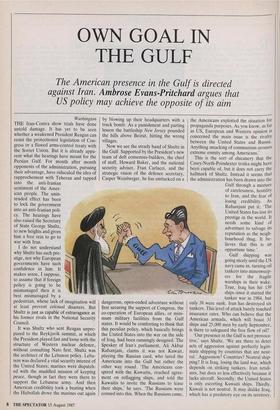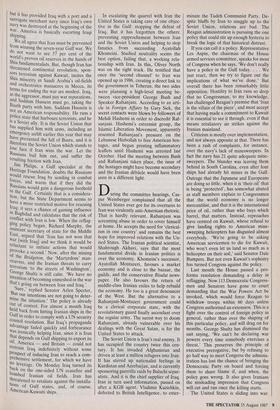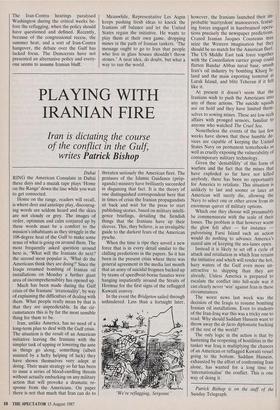OWN GOAL IN THE GULF
The American presence in the Gulf is directed US policy may achieve the opposite of its aim
against Iran. Ambrose Evans-Pritchard argues that
It was Shultz who sent Reagan unpre- pared to the Reykjavik summit, at which the President played fast and loose with the structure of Western nuclear defence, without consulting Nato first. Shultz was the architect of the Lebanon policy. Leba- non was declared a vital security interest of the United States; marines were dispatch- ed with the muddled mission of keeping peace, though in fact they were there to support the Lebanese army. And then American credibility took a beating when the Hizbollah drove the marines out again by blowing up their headquarters with a truck bomb. As a punishment and parting lesson the battleship New Jersey pounded the hills above Beirut, hitting the wrong villages.
Now we see the steady hand of Shultz in the Gulf. Supported by the President's new team of deft consensus-builders, the chief of staff, Howard Baker, and the national security adviser, Fran Carlucci, and the strategic vision of the defence secretary, Casper Weinberger, he has embarked on a dangerous, open-ended adventure without first securing the support of Congress, the co-operation of European allies, or mini- mum military facilities from the Gulf states. It would be comforting to think that this peculiar policy, which basically brings the United States into the war on the side of Iraq, had been cunningly designed. The Speaker of Iran's parliament, Ali Akbar Rafsanjani, claims it was not Kuwait, playing the Russian card, who lured the Americans into the Gulf but rather the other way round. 'The Americans con- spired with the Kuwaitis, reached agree- ment on reflagging ships, and told the Kuwaitis to invite the Russians to lease their ships,' he says. 'The Russians were conned into this. When the Russians came, the Americans exploited the situation for propaganda purposes. As you know, as far as US, European and Western opinion is concerned the main issue is the rivalry between the United States and Russia. Anything smacking of communism arouses extreme enmity among Americans.'
'Our presence in the Gulf is not provoca- tive,' says Shultz. 'We are there to deter acts of aggression against perfectly legiti- mate shipping by countries that are neut- ral.' Aggression? Countries? Neutral ship- ping? It is Iraq, losing the land war, which depends on striking tankers. Iran retali- ates, but does so less effectively because it lacks aircraft. Secondly, the United States is only escorting Kuwaiti ships. Thirdly, Kuwait is not neutral. It may dislike Iraq, which has a predatory eye on its territory, but it has provided Iraq with a port and a surrogate merchant navy since Iraq's own navy was destroyed at the beginning of the war. America is basically escorting Iraqi shipping.
We all agree that Iran must be prevented from winning the seven-year Gulf war. We do not want to see 57 per cent of the world's proven oil reserves in the hands of Shia fundamentalists. But, though Iran has threatened continental revolution, spon- sors terrorism against Kuwait, incites the Shia minority in Saudi Arabia's oil-fields and orchestrates massacres in Mecca, its terms for ending the war are modest. Iraq, as the aggressor, must pay war reparations, and Saddam Hussein must go, taking the Baath party with him. Saddam Hussein is not an American responsibility. He runs a police state that harbours terrorists, and he Is a Soviet ally. It is the Soviet Union that has supplied him with arms, including an emergency airlift earlier this year that may have prevented the fall of Basra, and it is therefore the Soviet Union which stands to lose face if Iran wins the war. Let the Russians bail him out, and suffer the resulting friction with Iran.
Jim Philips, a Gulf specialist at the Heritage Foundation, doubts the Russians would rescue Iraq by sending in combat forces, and warns that if they did the Russians would gain a dangerous foothold in the Gulf. Certainly that is a considera- tion, but the State Department seems to have a more restricted motive for rescuing Iraq: it sees a chance of gaining influence in Baghdad and calculates that the risk of conflict with Iran is low. When the reflag- ging policy began, Richard Murphy, the assistant secretary of state for the Middle East, argued that 'Iran has not won that war [with Iraq] and we think it would be reluctant to initiate actions that would provoke a second.' Now, after the mining of the Bridgeton, the 'Martyrdom' man- oeuvres, and the Iranian threats to carry terrorism `to the streets of Washington', George Shultz is still calm. 'We have no Intention of becoming enmeshed in the war that's going on between Iran and Iraq.' 'Sure,' replied Senator Arlen Specter,
But our intentions are not going to deter- mine the situation.' The policy is already
out of control. For almost a month Iraq held back from hitting Iranian ships in the Gulf in order to comply with a UN security council resolution. But Iraq's propaganda advantage faded quickly and forbearance was ironically helping Iran, since it is Iran that depends on Gulf shipping to export its oil• America — and Britain — could not restrain Iraq indefinitely without some prospect of inducing Iran to reach a com- prehensive settlement, for which we have no leverage. On Monday Iraq turned its back on the one-sided UN ceasefire and bombed Iranian oil fields. Iran has threatened to retaliate against the installa- tions of Gulf states, and, of course, American-KuWaiti ships. In escalating the quarrel with Iran the United States is taking care of one objec- tive in the Gulf: stopping the defeat of Iraq. But it has forgottten the others: preventing rapprochement between Iran and the Soviet Union and helping to stop fanatics from succeeding Ayatollah Khomeini. Studied neutrality seems the best option, failing that, a working rela- tionship with Iran. In this, Oliver North was on the right track. He testified that once the 'second channel' to Iran was opened up in 1986, creating a direct link to the government in Teheran, the two sides were planning a high-level meeting be- tween vice-president George Bush and Speaker Rafsanjani. According to an arti- cle in Foreign Affairs by Gary Sick, the secret contacts were blown by followers of Mehdi Hashemi in order to discredit Raf- sanjani. Hashemi's extremist group, the Islamic Liberation Movement, apparently resented Rafsanjani's pressure on the Lebanese Hizbollah to free American hos- tages, and began printing inflammatory leaflets until Hashemi was arrested last October. Had the meeting between Bush and Rafsanjani taken place, the issue of the hostages might have become secondary and the Iranian debacle would have been seen in a different light.
During the committee hearings, Cas- par Weinberger complained that all the United States ever got for its overtures to Iran was virulently anti-American rhetoric. That is hardly relevant. Rafsanjani was screaming abuse in order to cover himself at home. He accepts the need for 'clerical- ism in one country' and remains the best hope for improved relations with the Un- ited States. The Iranian political scientist, Shahrough Akhavi, says that the most fundamental divide in Iranian politics is over the economy. Khomeini's successor, Ayatollah Montazeri, favours a market economy and is close to the bazaar, the guilds, and the conservative Risalat news- paper. He also favours the return of middle-class Iranian exiles to help rebuild the economy. He too is a great denouncer of the West. But the alternative to a Rafsanjani-Montazeri government could be a clerical corporate state, with the revolutionary guard finally ascendant over the regular army. The surest way to doom Rafsanjani, already vulnerable over his dealings with the Great Satan, is for the United States to attack.
The Soviet Union is Iran's real enemy. It has occupied the country twice this cen- tury. It has invaded Afghanistan and driven at least a million refugees into Iran. It has stirred up nationalist feelings in Kurdistan and Azerbaijan, and is currently sponsoring guerrilla raids by Baluchi separ- atists. And it is the chief supplier of Iraq. Iran in turn used information, passed on after a KGB agent, Vladimir Kuzichkin, defected to British Intelligence, to exter-
minate the Tudeh Communist Party. De- spite bluffs by Iran to snuggle up to the Soviet Union, relations are bad. The Reagan administration is pursuing the one policy that could stir up enough hysteria to break the logic of that historical distrust.
If you can call it a policy. Representative Les Aspin, the chairman of the House armed services committee, speaks for most of Congress when he says, 'We don't really have a policy in the Gulf today. . . . We just react, then we try to figure out the implications of what we've done.' But overall there has been remarkably little opposition. Hostility to Iran runs so deep that no Congressman, to my knowledge, has challenged Reagan's premise that 'Iran is the villain of the piece', and most accept that having made a commitment to Kuwait it is essential to see it through, even if that means retaliatory air strikes against the Iranian mainland.
Criticism is mostly over implementation, and not always apposite at that. There has been a rash of complaints, for instance, over the navy's lack of minesweepers. In fact the navy has 21 quite adequate mine- sweepers. The blunder was leaving them behind in South Carolina, even after four ships had already hit mines in the Gulf. Outrage that the Japanese and Europeans are doing so little, when it is 'their oil' that is being 'protected', has somewhat abated as staff members explain to Congressmen that the world economy is no longer mercantilist, and that it is the international price of oil, rather than who buys which barrel, that matters. Instead, reproaches have centred on Kuwait, whose refusal to give landing rights to American mine- sweeping helicopters has disgusted almost everybody. 'We're going to be asking American servicemen to die for Kuwait, who won't even let us land so much as a helicopter on their soil,' said Senator Dale Bumpers. But not even Kuwait's sophistry has turned Congress against the policy.
Last month the House passed a pro- forma resolution demanding a delay in reflagging. Now 113 Democratic Congress- men and Senators have gone to court demanding that the War Powers Act be invoked, which would force Reagan to withdraw troops within 60 days unless Congress authorised an extension. This is a fight over the control of foreign policy in general, rather than over the shaping of this particular policy, and will drag on for months. George Shultz has dismissed the suit saying, 'We can't be declaring war powers every time somebody exercises a threat.' This preserves the principle of executive prerogative, but by refusing to go half way to meet Congress the adminis- tration has lost the chance of bringing the Democratic Party on board and forcing them to share blame if, and when, the policy goes wrong. It also gives Iranians the misleading impression that Congress will cut and run once the killing starts. The United States is sliding into war. The Iran-Contra hearings paralysed Washington during the critical weeks be- fore the reflagging, when the policy should have questioned and defined. Recently, because of the congressional recess, the summer heat, and a sort of Iran-Contra hangover, the debate over the Gulf has lacked focus. The Democrats have not presented an alternative policy and every- one seems to assume Iranian bluff. Meanwhile, Representative Les Aspin keeps pushing fresh ideas to knock the Iranians off balance and let the United States regain the initiative. He wants to play them at their own game, dropping mines in the path of Iranian tankers. 'The message ought to go to Iran that people who live in glass houses shouldn't throw stones.' A neat idea, do doubt, but what a way to run the world.




















































 Previous page
Previous page